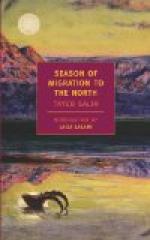In the midst of his wrecked drugs and cherished personal effects the Doctor is a pitiful sight. By stage and by scow, he has been confiding to us that, in order to save bulk, his medicines have been specially put up for him in highly concentrated form by London chemists. One little pill-box of powder is potent enough to make a dozen quart-bottles of effective medicine. And now all these precious powders have melted together, and appear like Dicken’s stew at the Inn of the Jolly Sand-boys “all in one delicious gravy.” The Doctor is dazed, and offers to white and brown alike a tin box with “Have a pastile, do.” He wanders among the half-breeds, offering plasters for weak backs, which they accept with avidity as combining two things that the red man specially appreciates,—something free and something medicinal. Sad-faced, the Doctor brings to me a glass case holding a dozen lozenge-shaped disks on each of which an infinitesimal piece of wood rests. “Here are some authenticated relics, but unfortunately the water has made them run and I don’t know them apart. You see they have the seal of the Carthusian Monastery on the back. One of them is a piece of the true Cross, but I shall never be able to tell which it is.” One by one the Doctor digs out from the wreck his water-soaked treasures,—a presentation “Life of the Countess of Munster,” also a crucifix from her, and a beautifully-carved holy water stoup of French design which he declares to be “as old as the Conqueror.” There is a medal of the Worshipful Company of Cutlers which carries with it the freedom of the City of London. Another order shows the Doctor to be a Knight of the Primrose League; and, fished from under a side of bacon, is a print of “my great-grandfather who discovered a cure for scurvy.” A missionary’s box of toys for some Christmas tree in Far North fastnesses is opened, and here a native stops work to lead along the sand a pink-and-blue alligator.
[Illustration: Miss Gordon, a Fort McMurray Trader]
Although the wrecked scow has its grotesque features, the sight is a sad one, and we are glad to leave it and pull across the river to Fort McMurray. We call upon Miss Christine Gordon, a young Scottish woman and a free-trader, if you please, in her own right, operating in opposition to the great and only Hudson’s Bay Company. The only white woman on a five hundred mile stretch of the Athabasca, she has lived here for years with the Indians for companions, her days being marked out by their migrations and tribal feasts. We question, “Are you not lonely, especially in the winter?” But she smiles and refuses to be regarded as heroic. “Often in the winter a trapper passes through, and the Indians are always coming and going, and they are full of interest.”




